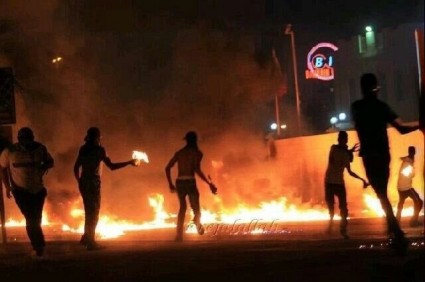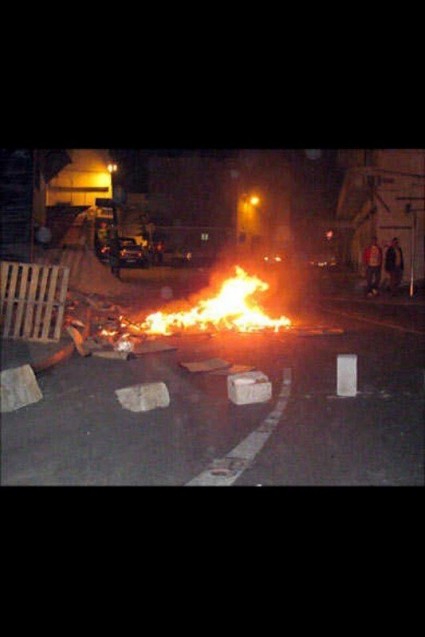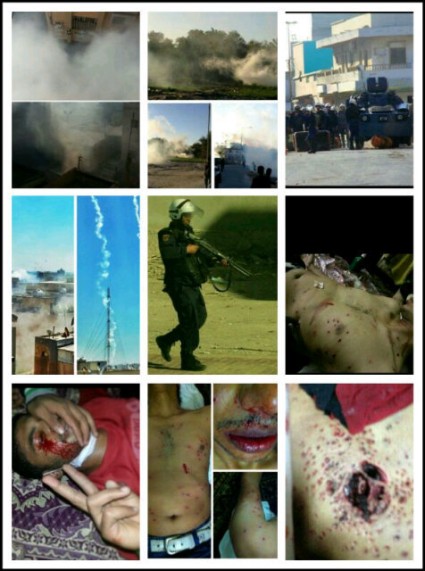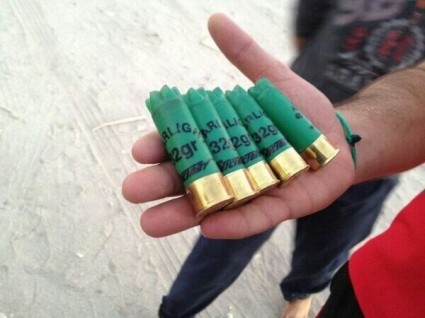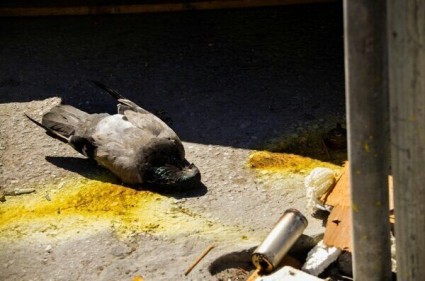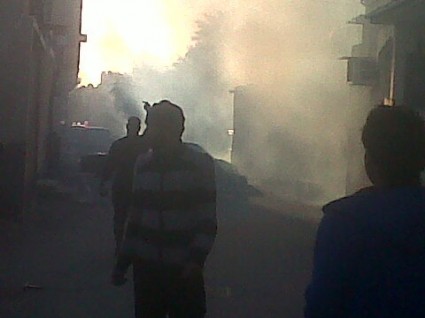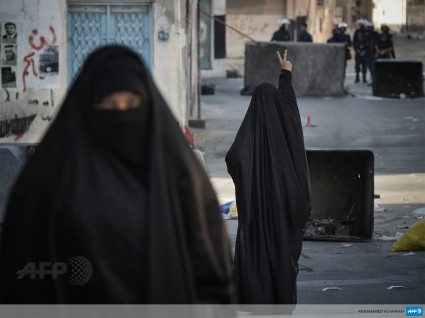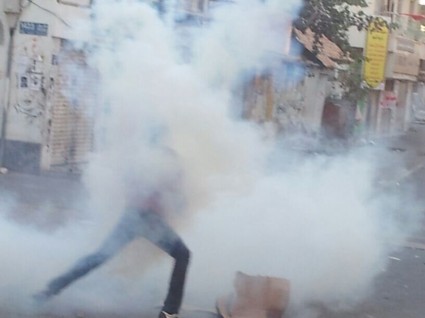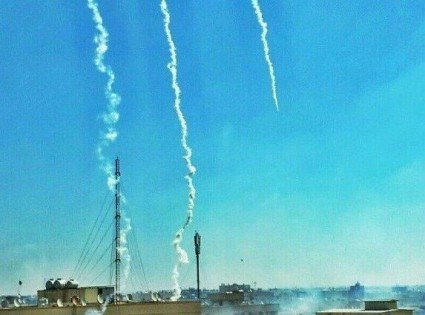Bahrain on your Anniversary and as Victory grows closer
February 14, 2013 No Comments
Kingdom Falling, Revolutions Morning Sounding Louder, Growing Stronger
February 14, 2013 No Comments
The firelight of nights dark eve calls for Freedom
February 14, 2013 No Comments
Bahrain sees Two plus years of Uprising, Catastrophe Knocks at Hamad’s door
Two years into our uprising, the government must concede to change – or Bahrain faces catastrophe
Bahrain: it’s time to act
14 February, 2013 – UK Guardian
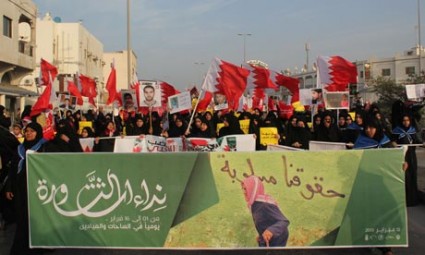
Women march in Bahrain to mark the second anniversary of the uprising.
It is two years on Thursday since thousands of Bahrainis, young and old, male and female, Sunni and Shia, took to the now demolished Pearl Square in the capital, Manama, to demand democracy. They were inspired by the Arab spring, but had decades of their own struggle behind them. This might be the moment to end the stereotype that the Gulf knows only dictatorship.
It’s true that our goal has not yet been achieved. But our uprising is neither a failure, nor was it crushed under the weight of tanks brought over the border from Saudi Arabia. Last week, as part of a series of protests to mark the second anniversary, thousands took to the streets under the banner of “no U-turn”.
That message is clearly understood by the authorities. They agreed, finally, to engage with the opposition in a national dialogue that began this week. It’s in stark contrast to the usual response we have been given thus far: killings, repression, sackings, violence and more. But those human rights violations have remained, and there is no guarantee that this dialogue will bring about reform.
Opposition groups – known as societies, since political parties are not strictly legal – entered into this dialogue in the hope that it would end the stalemate. It is our duty to make the effort to find a peaceful solution, but a political negotiation that has a website, a logo, social media accounts and all sorts of PR-friendly features will undoubtedly be of concern to those who want it to be serious. We have raised questions that have yet to be clearly answered about the process of the dialogue, but the government’s position remains baffling.
It has said its role is to be a moderator between the political societies, and that it will implement any agreed consensus. This is no different to the parliament we engaged with between 2006 and 2011, which turned out to be ineffective in creating any change, or even holding the government to account.
This attitude – that Bahrain’s problems exist primarily between its own people – is an attempt to deflect responsibility away from the government and to play up the false idea that this conflict is sectarian. The fact that half the opposition delegates who attended the first dialogue session were Sunnis shoots this argument to pieces.
The elitist attitude of a government that can absolve itself of responsibility for a crisis of its making goes to the very heart of the people’s demands. Bahrain needs an elected government that reflects the popular will. A government of the people, rather than one that sees itself as being above the people and chooses to implement or ignore whatever it deems appropriate.
The difficulty lies in a ruling family that is split between two very different visions for the future. One section understands that Bahrain cannot move forward without the consent of the people. The other believes that crushing the people is the right strategy. Hence this strange half dialogue, in which no one is really sure, even in government, what is actually going on.
For dialogue to be a success, the government needs to realise the system it presides over is fundamentally flawed and work with the opposition to create a series of reforms that will see a united and democratic Bahrain.
We need a political system that agrees that 42 years is an absurd period of time for one prime minister to stay in power; and that a biased judiciary which can give life sentences to peaceful opposition leaders while failing to prosecute a single high-ranking figure for torture, needs reform. Economically, we must move away from reliance on oil and create a sustainable and diversified economy; and, socially, we need to end the sectarian discrimination that keeps Shias out of mainstream society.
In November 2011 we pinned our hopes on the Bahrain Independent Commission of Inquiry (BICI), when it outlined the violations committed by our regime. The king accepted its recommendations in full, and it had the potential to usher in a new era – but in the end the authorities used it as an excuse to delay finding a solution. …more
February 14, 2013 No Comments
Regime Assassinates teen on Anniversary of Uprising
Teen dies as crowds protest in Bahrain on 2nd anniversary of uprising
14 February, 2013 – Shafaqna
SHAFAQNA (Shia International News Association) — A teen died in clashes in Bahrain as protesters hit the streets Thursday on the two-year anniversary of a failed uprising in the nation, authorities said. Authorities are investigating the Thursday morning death of a 16-year-old teen and trying to determine how it occurred, according to a government statement.
Al-Wefaq, Bahrain’s main Shiite opposition party, said the teen was killed when he was hit by bird pellets shot by Bahraini security forces. Protesters demonstrated in several villages around Manama, the nation’s capital Thursday, the second anniversary of a major uprising. Two years ago, on February 14, protests began with many demanding political reforms and greater freedoms in the Sunni-ruled, Shiite majority nation.
The unrest was spurred by movements in Tunisia and Egypt. But demonstrations in Bahrain failed to gain the traction of other Arab Spring uprisings after a crackdown by authorities in the island state. The crackdown was backed by troops from nearby Saudi Arabia and the United Arab Emirates.
In November of that year, Bahrain’s Independent Commission of Inquiry issued a report critical of authorities’ reactions to the protests. The independent commission, set up by the king, concluded that the police had used excessive force and torture in their response to the protests in Sunni-ruled, Shiite-majority country.
Abuse of detainees in the crackdown included beatings with metal pipes and batons, and threats of rape and electrocution, according to Mahmoud Cherif Bassiouni, the commission chairman. The report recommended reforms to the country’s law and better training of its security forces, as well as other measures. …source
February 14, 2013 No Comments
Squelching the Voice for the Voiceless – The cowardly brutality of a Monarch without a moral compass
Bahrain: Silencing the voice of the voiceless
14 February, 2013 – Shafaqna
SHAFAQNA (Shia International News Association) — Bahrain is a small country, often forgotten unless the Fifth Fleet of the US Navy, which it hosts, is in the news. A country where people continue to fight for democracy despite the high, sometimes deadly, price of speaking out. A country which, for the past two years, has been living to the beat of police crack-downs, arbitrary detentions and tear gas shootings.
I visited Bahrain twice since February 14, 2011, when the Arab Spring protests began. I first went, in April 2012, to meet my friend and colleague Nabeel Rajab, International Federation for Human Rights (FIDH) Deputy Secretary General and President of the Bahrain Centre for Human Rights, as well as other human rights defenders, victims of state violence, and government officials.
Rajab, one of Bahrain’s most prominent human rights defenders, was able to provide me with direct accounts of what had been happening in his country over the previous year. For years, he has been fighting to document and expose the abuses of the Bahraini authorities to the rest of the world, particularly the monarchy’s most influential ally, the United States.
My second trip, a couple of months later, was a difficult one as I returned to observe Rajab’s appeal in September. He had been arrested and convicted for supporting and participating in “illegal gatherings” – the regime’s euphemism for freedom of association. He was denied bail at the hearing I attended, and in December 2012, an appeals court sentenced him to two years in prison for participating in peaceful demonstrations and using his Twitter account to call on others to join. During his detention, Rajab was isolated from other prisoners of conscience and housed in a separate unit.
Rajab’s case is the norm rather than the exception for human rights defenders working in Bahrain.
Languishing in prison
Like Rajab, scores of Bahrainis are languishing in prison simply for having marched in the street to call for economic, social and political reforms. Human rights defenders have become a major target of the regime, with one leading human rights defender after another being arrested for documenting the ongoing abuses. It seems that in today’s Bahrain, the surest way to prison is human rights work.
In July 2011, after mounting pressure from the international community, Bahrain’s King Hamad bin Isa Al Khalifa empowered a group of international experts to investigate the events of 2011. The Bahrain Independent Commission of Inquiry (BICI) published its report in November 2011, clearly identifying the regime’s repressive practices: arbitrary arrests, torture, harassment, lack of access to independent courts respecting fundamental fair trial principles, unfair dismissals, and the list goes on.
Since the publication of this report, the disproportionate use of force by security forces has already resulted in the death of 24 individuals, mainly during protests and due to the excessive use of tear gas or rubber bullets.
Impunity remains the backdrop for these state-sponsored human rights violations. As of now, very few sentences have been rendered by courts for security officers accused of severe human rights violations and those convicted are low-ranking officers. Moreover, torture accusations by those unlawfully detained continue to be dismissed by the judicial system. …more
February 14, 2013 No Comments
Bahrain Human Rights Defenders are Targets of Regime Brutality and Harsh Criminal Punishment
Bahrain: Human Rights Defenders are Targeted by the Government Due to Their Peaceful and Legitimate Human Rights Activities
14 February, 2013 – Bahrain Center for Human Rights
On the second anniversary of the Bahraini uprising for human rights and democracy, The Gulf Center for Human Rights (GCHR) and the Bahrain Center for Human Rights (BCHR) renew their calls for the immediate release of all the detained human rights defenders in Bahrain. We call for the immediate release of the co-founder of both the Bahrain Center for Human Rights (BCHR) and the Gulf Centre for Human Rights (GCHR), Abdulhadi Al-Khawaja who worked for years locally and on the international level to promote and defend human rights in MENA region and Bahrain in particular. We call also for the immediate release of the president of the Bahrain Center for Human Rights (BCHR) and the newly elected –while in prison- General Secretary of the GCHR Board, Nabeel Rajab, who have been targeted for his peaceful human rights activities especially after the crackdown on protesters during February and March 2011. We call as well to put an end to the ongoing crackdown on all other human rights defenders and activists who are either in jail, in exile, in hiding or awaiting trials that probably will be resulted in prison sentences against them.
On Feb 14, 2011 the Bahraini people took to the streets demanding freedom, human rights recognition, and democracy for their own country. The peaceful protesters were met with sever repression that included the use of excessive force against. As a result of that many innocent citizens either lost their lives or got wounded. Also, during the same period from 16 March to the end of May 2011, the country was placed under the state of National Security, giving full power to the army and security forces. This was the time when some human rights defenders such as Nabeel Rajab have played vital roles in reporting and documenting and publishing information about the massive human rights violations in Bahrain and the indiscriminate attacks on people. By talking directly to the media, using the social media networks at time of travel ban, communicating with international human rights organizations and the UN various human rights bodies, Nabeel Rajab and his colleagues were able to keep the eyes on Bahrain and expose the violations to the world, which have eventually resulted in a sufficient pressure that succeed in both ending the emergency status and the set up of Bahrain Independent Commission of Inquiry (BICI) by order from the King of Bahrain himself. …more
February 14, 2013 No Comments
Talks with Al-Khalifa Regime Meaningless
Opposition Figure Describes Proposed Talks with Al-Khalifa Regime as Meaningless
13 February, 2013 – FARS
TEHRAN (FNA)- A senior Bahraini opposition figure dismissed talks between the al-Khalifa regime and the country’s dissidents as meaningless at a time when Bahrain’s political leaders and main opposition figures are in jail.
“All dissidents are in prison, political leaders are either in solitary confinement or under house arrest while the Saudi forces have the country still under their occupation and in such an atmosphere negotiation is meaningless,” Rashed al-Rashed, a leader of Bahrain’s Amal Movement, told FNA on Wednesday.
“There are no national reconciliation talks in Bahrain and what is going on is a propaganda attempt by the regime,” he added.
He noted that the al-Khalifa regime has lost its legitimacy, and hence the talks offer lacks credibility.
Also earlier today, a spokesman for the February 14 Youth Movement – a main opposition to the Manama regime – said that the al-Khalifa regime is no longer qualified to rule Bahrain due to the scope of crimes that it has committed so far, and added that the country’s revolutionaries are left with no other option but to topple the regime.
“We call on people to continue their protests and not to be deceived by the al-Khalifa plots. The people of Bahrain have a clear and single goal. Al-Khalifa is no longer qualified to rule the country due to the crimes it has committed and after the Saudi forces entered the country,” Abdulrao’uf al-Shaeb told FNA.
“I believe that the Bahraini revolutionaries are quite vigilant about the continuation of the revolution and the necessity for bringing substantial changes and these talks have not influenced their movements and protests, but it has inflamed the revolution’s flames and has made the people more determined to continue their path to the overthrow of the Al-Khalifa regime,” he added.
Earlier this month, a senior Bahraini opposition figure described the al-Khalifa regime’s proposal for talks with dissidents as a failed plan, and said talks under the Saudi occupation are meaningless.
“I don’t believe that there is no serious plan for (the national) talks, and that no comprehensive agreement is considered (by the Bahraini regime),” Saeed al-Shahabi, Secretary-General of Bahrain Freedom Movement, told FNA at the time.
Shahabi said that the al-Khalifa has actually proposed the plan for talks to conceal the realities and the reality is that the Bahraini people have a big problem with the monarchy ruling their country.
He also called for the withdrawal of the Saudi forces who are collaborating with the al-Khalifa forces in suppressing the peaceful protests in Bahrain, and said any form of talks under the occupation of the Saudi forces would be impossible.
Anti-government protesters have been holding peaceful demonstrations across Bahrain since mid-February 2011, calling for an end to the al-Khalifa dynasty’s over-40-year rule, end of discrimination, establishment of justice and a democratically-elected government as well as freedom of detained protesters.
Violence against the defenseless people escalated after a Saudi-led conglomerate of police, security and military forces from the Persian Gulf Cooperation Council (PGCC) member states – Saudi Arabia, Kuwait, the United Arab Emirates, Oman and Qatar – were dispatched to the tiny Persian Gulf kingdom on March 13, 2011, to help Manama crack down on peaceful protestors.
So far, tens of people have been killed, hundreds have gone missing and thousands of others have been injured. …source
February 14, 2013 No Comments
CS Gas and State Violence meets 2+ years of Uprising in Bahrain
February 14, 2013 No Comments
Activist Maryam al-Khawaja Speaks-out about the recent history of Uprising in Bahrain
February 14, 2013 No Comments
Day 35 of Hunger Strike as Politcal Prisoners Protest Torture, Abuse
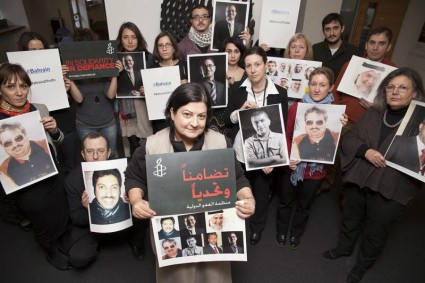 Ebrahim Sherif’s wife and others show solidarity with prisoners of conscience in Bahrain
Ebrahim Sherif’s wife and others show solidarity with prisoners of conscience in Bahrain
Bahraini prisoners on hunger strike in protest at mistreatment
13 February, 2013 – PressTV
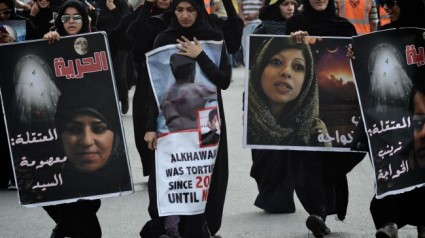
Bahraini women hold portraits of female prisoners during a rally in Janosan Village, in the western suburb of Manama, on May 18, 2012.
Several political prisoners have gone on a hunger strike in a prison in Bahrain in protest at the mistreatment of prisoners by prison officials, a report says.
The hunger-strikers took the initiative due to the violation of their basic rights and the dire condition of their living in the prison.
The Bahraini prisoners are deprived of their preliminary human rights, including visiting their families, which is the positive proof of illegal behavior of prison officials.
This came amid the continuation of anti-regime protests and the Bahraini people’s demands for the immediate release of political prisoners.
Bahrainis have been staging demonstrations since mid-February 2011, demanding political reform and a constitutional monarchy, a demand that later changed to an outright call for the ouster of the ruling Al Khalifa family following its crackdown on popular protests.
Dozens of people have lost their lives in the crackdown, and the security forces have arrested hundreds, including rights activists, doctors and nurses.
Bahraini demonstrators say they will continue holding anti-regime protests until their demand for the release of prisoners and the establishment of a democratically elected government is met. …source
February 14, 2013 No Comments
Chemical Gas filled streets mark Anniversary of Uprising
Tear gas fills Bahraini capital as hundreds mark uprising anniversary
13 February, 2013 – RT
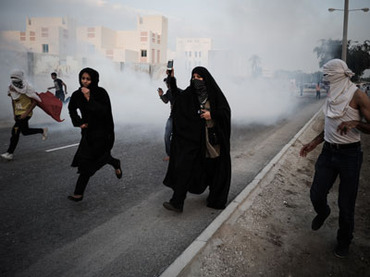
Bahraini protestors run for cover from tear gas fired by riot police following an anti-government rally to demand political reforms on February 12, 2013.(AFP Photo / Mohammed Al-Shaikh)
Bahraini protestors run for cover from tear gas fired by riot police following an anti-government rally to demand political reforms on February 12, 2013.(AFP Photo / Mohammed Al-Shaikh)
Bahraini police have used tear gas and stun grenades to disperse hundreds of protesters in Manama, as they marked the second anniversary of the Shiite-led uprising against the Sunni regime.
Demonstrators tried to march to Pearl Square, the site they occupied two years ago when the protest against the royal family – rulers for over 40 years – first began.
“Square of martyrdom, we all still have the will! Down with the corrupt government!” chanted protesters carrying Bahraini flags as reported by AFP.
“Khalifa resign,” the demonstrators also called, referring to the king’s uncle Prince Khalifa bin Salman, who has been prime minister for four decades.
The attempt to march to the square came after the main Shiite opposition bloc, al-Wefaq, organized a massive protest in which thousands took part in the Shiite village of Sanabis, near Manama.
After the opposition’s rally ended, “a group of saboteurs caused riots and blocked roads, requiring authorities to take legal action against them,” the interior ministry said on Twitter.
Opposition supporters have been demonstrating for more than a week ahead of the anniversary which is set for February 14. A Clandestine radical cyber-group Revolution Youth Coalition has reportedly called for demonstrations marking the date.
During the uprising in 2011, protesters camped for one month at Pearl Square before being forcefully driven out in mid-March. Authorities later razed the square.
Anti-government protesters have been holding demonstrations across Bahrain since that moment, calling for an end to the discrimination of the state’s Shiite majority by the predominant Sunni government.
Eighty people have been killed and thousands arrested since the unrest began. Many opposition figures have been arrested on the allegation of planning to topple the government.
The opposition believes that one of the reasons why Western powers support the “dictatorship” is the crucial US naval military base located in Bahrain. Meanwhile, Bahraini authorities claim the country has no problems with freedom of speech or democracy and denounce protesters as criminals and saboteurs trying to instigate revolution and topple the legitimate government. …source
February 14, 2013 No Comments
US Supplied Black-Hawk helicopters conduct indiscriminate aerial bombings of Bahrain Villages on Anniversary of Uprising
February 14, 2013 No Comments
Bahrain Regime engaged in systematic widespread use of CS Gas in lethal assaults against Children and Elderly
February 14, 2013 No Comments


